Egfold and the Prophecy of Hervisa – In the Third Era preceding Emperor Craecius death, the far eastern lands of the Empire were ravaged by war and anarchy. In those troubled times, in the still prosperous city of Hervisa, a young strong boy was born by the name of Egfold, a boy who, as prophecy had foretold, was going to play a decisive role in the fate of the Empire in the years to come.
Egfold spent his childhood years happily wandering the vast pine forests of Hervisa, hunting, exploring and training in the art of war. The only son of a local farmer, he had known little of the world past his family’s small cider farm, where he grew up, and the busy streets of the city. In his early twenties, he was already a tall, robust young man, gifted with great physical prowess and natural leading skills. However, anyone who knew him would immediately concede that his strongest character trait was a high sense of righteousness and patriotism that dictated his every choice.
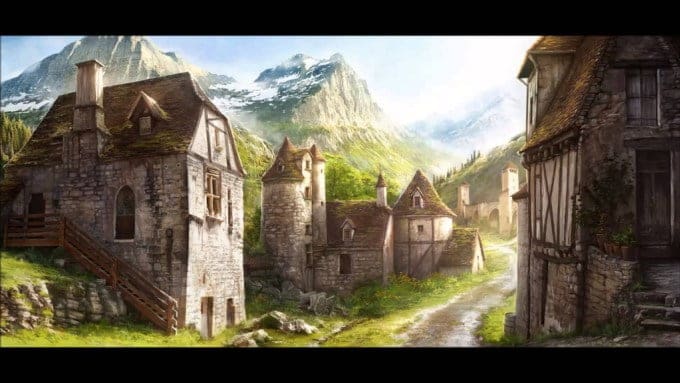
Our story begins a rainy summer morning, in the stone square outside the city’s town hall, where the citizens were quickly gathering around a strange, young man in a dark green cape that had just arrived in Hervisa with grave news about the ongoing war. He was a royal emissary from the front spreading the word in the far corners of the eastern lands that their great capital was lost to the enemy over a fortnight ago and enemy troops were now marching almost without resistance against all major cities to the east. The honored brotherhood of the Dark Templars was sending an urgent call for assistance to any man fit to raise a blade to come forward and join their ranks in defending their homes from the dreadful Nordish army.
This was exactly the opportunity the skilled young warrior had been waiting for his entire life and didn’t hesitate a moment to put on his gear and muster the best soldiers of Hervisa to fight at his side, under the banner of the Dark Templars. The journey to the war front was long and hazardous but Egfold and his men were strong and determined to face any danger in front of them.
As soon as they reached the large military Templar camp, Egfold set off to find the leader of the brotherhood, a tough seasoned general by the name of Valshan. General Valshan, first commander of the Elite Dark Templars, was located at the very center of the huge camp, in a spacious black tent, heavily guarded at all times. Had it not been for the long deep friendship that tied the two warriors from their earliest years, Egfold would have found it impossible to even approach the man. The general trusted the young soldier completely and felt great honor and pride to accept his friend’s request for a permanent and more official enrollment in the ranks of the Dark Templars. Unfortunately, there was practically no time to stand on ceremony and as such, Egfold would have to prepare his men and immediately depart for the front, where vicious battles were currently taking place.
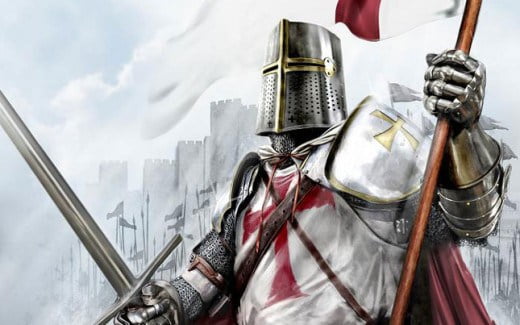
The fearsome Nordish army, emerging from the distant rocky western lands of the Empire, counted thousands of hundreds of tough experienced soldiers, including swordsmen, spearmen, archers and cavalry, thus forming a terrible force not to be reckoned with. Their leaders had been forged in the fires of war and their fortresses were said to be impenetrable. They came from an ancient tribe of Nordic Knights, which first inhabited the west centuries ago. It was a resilient and extremely belligerent tribe, always engaged in war to serve their need for wealth, lands or glory in the name of expansionism.
The general turmoil that naturally followed news of the upcoming threat all across the eastern lands was fairly reduced after the first few weeks of battle. The Dark Templars were making considerable efforts in pushing back the enemy troops and had so far successfully managed to hold their ground and prevent the Nordish from advancing further in their lands. During one such fierce battle in the outskirts of the once thriving city of Nargol, a large battalion of Elite Dark Templar soldiers, under direct orders from General Valshan, launched a well-planned savage assault against a large Nordish regiment that was scouting the area. The combat lasted almost a fortnight but the Templars prevailed and vanquished the enemy soldiers, sending them all back to Oblivion. Howbeit, the Templar battalion suffered significant casualties and General Valshan, who had been infected with a violent viral disease, was now unable to carry his duty as first commander. Therefore, Egfold, who was assigned temporary leadership of the Elite Dark Templars, was forced to take command in his own hands.
As a result of the swift organized counterattack of the Templar army under the competent direction of General Valshan, an important part of the eastern lands was now recaptured and freed from enemy control. Nevertheless, Nordish reinforcements were constantly replacing the losses of their troops and the harsh cold winter had taken its toll on the few remaining supply roots that provided rapid advancement for the Dark Templars across the land. To make things even worse, a few days after the battle of Nargol, General Valshan had finally succumbed to his high fever before any further medical assistance could reach him in time. Doubt and unrest spread fast amongst even old seasoned soldiers and morale was increasingly low.
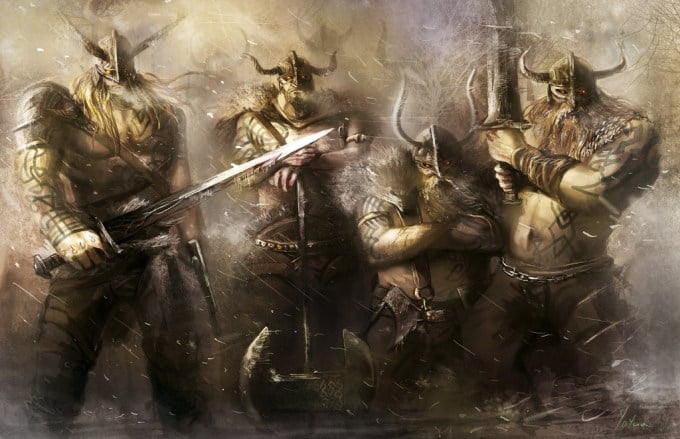
With the Templar battalions scattered across the border lines of the eastern lands or stationed at major cities and trading posts, it seemed nearly impossible to assemble their commanding leaders so they could decide on who would succeed their fallen companion as First Commander of the Elite Dark Templars. However, in the weeks preceding his death, General Valshan had granted his reliable comrade Egfold temporary leadership of his armies, based on his blind trust in the young man’s war skills and his undoubtedly impressive ability to maintain control of himself and his men in the midst of chaos. As a consequence, when young captain Egfold stepped up and took charge of the remaining Templar battalions in order to change war tactics and possibly gain the advantage over the enemy, his right to command was widely acknowledged by all the troops.
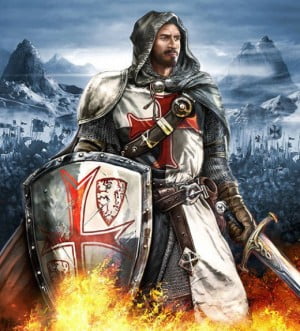
Egfold, acting as the new First Commander of the Elite Dark Templars, was now compelled to deal with a challenging dilemma. Facing the massive Nordish army in the open was no longer a valid option. Thus, a change in tactics seemed most imperative considering the current state of affairs. Two options presented themselves: he could either issue a general order of retreat and have the full remaining forces of Templar battalions defend the major cities preventing the enemy’s advancement, or he could choose a more risky course of action by sending small detachments of experienced warriors to infiltrate behind enemy lines and sabotage their progress in multiple areas simultaneously, cutting off their supply routes and using natural obstacles, like steep mountains, rivers and gorges, to ambush the larger regiments of the Nordish army.
Flowers blossomed, leaves regrew and swallows started rebuilding their nests singing joyfully to welcome a sunny warm spring. Nature appeared to stubbornly ignore the ruins left behind by the ongoing war between the two large armies. Cities destroyed and burnt to the ground, entire villages ravaged by the enemy and deserted, hundreds and hundreds of war casualties. Despite the timely change of tactics and the heroic sacrifices made by the Dark Templars, more than two thirds of the vast eastern lands were lost to the enemy while chaos and despair now reigned in the countryside. The perilous course of action that Commander Egfold had finally chosen failed to deliver the expected results and his battalions were suffering a bitter defeat at the hands of the Nordish. It slowly became more and more obvious that the only option still available to him would be a dishonorable capitulation, which could however prevent the loss of more innocent lives.
Once more, the young captain found himself standing at the gates of his birth town Hervisa, where the commanding officers of the remaining Templar battalions had sought refuge. The city was surrounded by three levels of high thick stone walls and several watchtowers crawling with archers and heavy catapults. With his army reduced to one fifth of its initial strength, Egfold, reluctant to surrender, saw no other alternative but to make his final stand against the Nordish in the very city where he was born. In a few days, the first regiments of the enemy army would appear over the distant hills and slowly march to besiege Hervisa, thus signaling the end of the Dark Templars and, consequently, the end of any further resistance in their relentless advancement.
During the grim endless nights that followed his retreat in Hervisa, Commander Egfold kept hopelessly looking for a way to defend the city and possibly turn the tide on the war. Scouts had already reported the imminent approach of the first wave of Nordish Knights over the hills. Time was not on his side. At a desperate moment, Egfold made a decision that was going to permanently change the fate of the eastern lands and affect the lives of the entire population for generations to come. In order to win this ruthless war and recapture the lost territory, further graver sacrifices would have to be made.
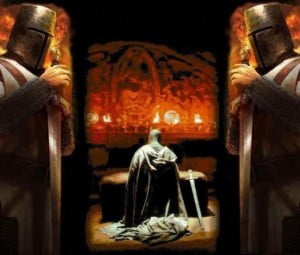
Under the shadowy cloak of the moonless night, Egfold found himself walking across the military camp alone, observing the feverish pace of the preparations and the rapid, almost panicked movements of his soldiers. More certain and determined than ever before, he retreated quietly to the privacy of his quarters where he could work without interruption to finalize his plan. He took off his heavy military gear and knelt decisively in front of the altar with the small golden and ivory statuettes of the revered Ancient Gods. One by one, he lit all the candles and watched the flames dance while he tried hard to empty his mind of every single thought. His voice hardly more than a whisper, he started chanting the ancient oath and praying in silence, calling forth the holy spirits of his Ancestors. He prayed and prayed as the hours went by until all the candles had burnt out and he was surrounded by absolute darkness. With the utmost respect, he called out the names of the Ancient spirits and made his final sacrifice. In exchange for a glorious victory and the complete defeat of the Nordish Knights, Egfold pledged to offer the revered Gods the submission of his very soul as well as the souls of every Dark Templar that is or will ever be, thus forming an invincible army of undead soldiers that no force known to man would ever be able to stop.
A few hours later, at the break of dawn, General Egfold and his men, armed to the teeth and with revived morale, exited the city of Hervisa and lined up in front of the gates waiting patiently for the Nordish Knights to commence the siege. With the blessing of the Ancient Gods and renewed, almost supernatural strength, Egfold had no doubt he would stand victorious before the sun set at the end of the day. The horrible battle that followed the confrontation of the two armies could only be described as an atrocious merciless slaughter, a savage massive extermination of thousands of Nordish soldiers, whose corpses now covered the entire valley of Hervisa coloring the soil a thick deep red. The few surviving Nordish battalions had fallen back in an undisciplined, rather chaotic retreat abandoning their comrades at the rage of the Templars. As promised by the holy spirits of his revered Ancestors, General Egfold had triumphed over his enemies and managed to prevent them from taking over the last standing fortress of resistance.
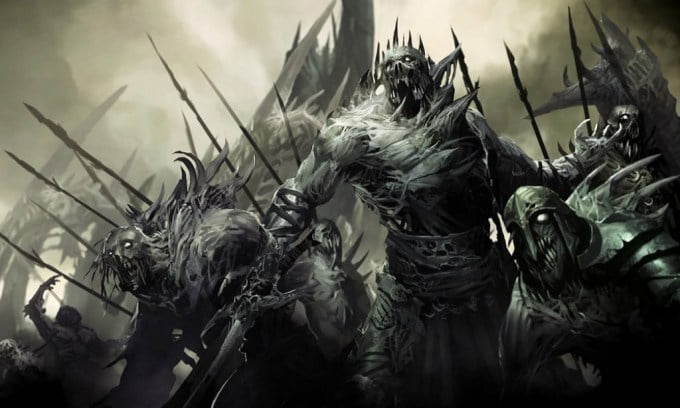
A year went by since the memorable battle of Hervisa and the war had not yet ceased. The brotherhood of the Dark Templars, more powerful and fearsome than it had ever been, had slowly eradicated every remnant of the once notorious army of Nordish Knights. Villages recaptured, cities liberated and war captives freed from slavery as the Templars pushed the enemy more and more towards the western borders and out of their territory. General Egfold and his Templars were worshipped all across the eastern lands as liberators and crusaders of freedom. As the last remaining enemy regiments were eliminated and the threat to the eastern lands faded, a period of glorified peace was gradually being reestablished.
Nonetheless, with the danger to the eastern lands now gone and its people rescued, young captain Egfold found himself forcibly bound to the will of his Ancestors, committed to fulfill the terms of his deal. The Nordish Knights had been vanquished to the last one and the Templars had regained control of their territory. Thus, it was time for the Ancient spirits to collect what was long due. The General ordered his battalions to march yet again towards Hervisa, where the deal was initially struck, so he could finally satisfy his vow to the Ancient Gods.
The very moment he set his eyes upon his beloved birth town, with its sapphire-blue streams, the rich pine forests and the high stone walls, he knew it would be the last time he ever saw its beauty through his human soul. There was no defying the Ancient spirits and he did not wish to. Once the dark of the night hid the horizon from his vision, the Ancient Gods descended through the shadows, as silently as a cool south breeze through the leaves, and one by one, claimed the Templars’ souls admitting them into their spirit realm, alongside the holy Ancestors. Just as the prophecy had long foretold, Egfold had changed with his actions the fate of the eastern lands and liberated his people, by sacrificing himself and his entire army to the service of the Gods.
No more than a shadow of his previous self, Egfold had now become a mere specter, a soulless phantom, entirely stripped of any human quality he once had. As the ultimate dominant warrior of his undead army, the General was eternally enslaved to serve his Gods and defend the eastern lands of all intruders, living or otherwise. Wrath, vengefulness and a senseless thirst for war and blood were the only motivations he recognized. For years to come, the eastern lands remained safely in the hands of its people, protected vigilantly by the undead Templar army that was constantly growing as more and more souls were claimed by the Ancient spirits.
However, as time would come to prove, even the holy spirits of the revered Ancestors could not have foreseen the profound corruption and fanaticism that had overtaken the Dark Templars and their terrible leader. Egfold’s insatiable desire for revenge demanded nothing less than rightful retribution against the Nordish oppressors. He gradually begun gathering a dreadful army of undead soldiers and vengeful spirits in order to launch a new war against the western lands and all its inhabitants, were they Nordish tribes, Orcs or Trolls. Master of a large invincible military force, Egfold met no resistance in claiming the eastern lands as his own, founding barracks and military training encampments all across the land, so as to prepare his troops for the upcoming invasion. He proclaimed himself Emperor of the Eastern Lands and First Commander of the, now undead, Elite Dark Templars, concentrating all authority in his own hands.
Wielding such power and engaging in yet another destructive war with the western tribes was not an outcome the Ancient Gods had anticipated. In an attempt to keep a tight rein on General Egfold and his voracious appetite for revenge and combat, the holy spirits of the Ancestors decided to moderate his catastrophic ambitions by intervening directly in his plans and reminding him strongly that the army of undead Dark Templars was in their service and, as such, they could disband it as they saw fit.
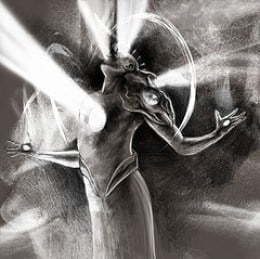
Blinded by hatred and deadly obsession, Emperor Egfold perceived the God’s intervention as a hostile and treacherous reaction, a way to undermine his efforts to eliminate all threats to the eastern lands. Furthermore, he quickly came to realize that by opposing the God’s will openly, there was a good chance he could be easily deprived of the army he had built with so much sacrifice. In his mind, the Ancient spirits now posed an equal threat to his survival and dominance as any other adversary. Therefore, to ensure the completion of his game plan, he thought indispensable the formation of a strong alliance with an army of at least equal potential as his own. Putting aside his differences for the time being, he decided to extend an offer of peace and cooperation to the most potent and influential of the western Nordish tribes, the renowned Vikings.
Combined together, the two large armies, consisting of powerful undead soldiers and fierce seasoned Nordic warriors, provided Emperor Egfold and King Odar, the leader of the fearsome Vikings, with a great fighting chance. Under false pretenses, General Egfold summoned the Ancient Gods to descend at a prearranged site on the borders of the eastern and western lands, where the assembled troops were waiting in ambush. According to ancient lore dating back to the first native tribes of the eastern lands, the only way to definitively wipe out a mighty ancient spirit, would be by summoning it to descend, so that is acquires a form of corporeal existence, which would then enable someone to eliminate it by cutting off the source of its power, located in its crowned head. As planned, once the Gods had descended, Dark Templars and Vikings fought, for the first time, side by side in a savage, brutal carnage that ended hours later with all Ancient spirits beheaded and, thus defeated once and for all.
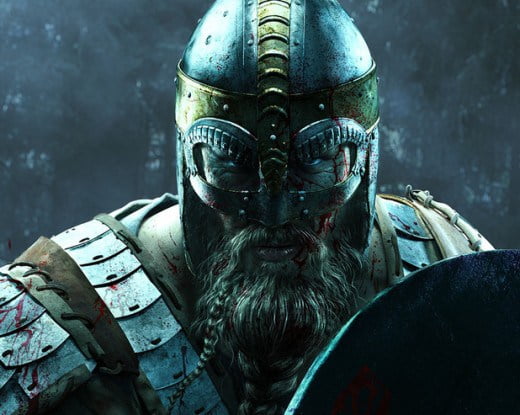
At long last liberated from his eternal bounds, General Egfold found himself experiencing a sense of serenity and satisfaction that had eluded him since the days of his human life had come to such an abrupt and horrific end. He would never be fully reunited with his tormented soul, but, at the very least, he could savor the thought that the treachery and horrible betrayal of the Ancient Gods had been avenged. In accordance with the peace treaty offered to his Nordish neighbors, Egfold kept his authority as Emperor of the eastern lands and First Commander of the Dark Templars, while King Odar was assigned the throne of the western lands in peaceful coexistence with the other native tribes.
A lengthy period of calm and prosperity followed the end of the hostilities, which was only partly interrupted by futile insurrections in the western lands. A few indigenous tribes of Orcs and Trolls had made several attempts to overthrow King Odar and remove the Vikings from power, but the strong alliance with the Dark Templars and their ongoing support rendered their efforts vain. However, the two leaders soon realized that although these incidents were always unsuccessful, they did pose a certain amount of risk and contributed in a general sense of doubt and instability that could in time prove harmful. Therefore, Egfold and Odar started a series of negotiations in order to come up with a satisfactory solution for both parties.
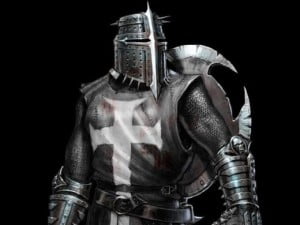
Before long, the two Kings had finally come to an agreement as to how best ensure the safety and prosperity of their lands. In the spirit of community, they decided that, like in their war against the Ancient Gods, their forces were absolutely invincible and invulnerable when combined together. Consequently, they thought vital to their dominance to no longer command two separate armies in two different lands, but one united force under the flag of a single vast powerful Empire.
The eastern and western lands united in one huge continent, by the name of Middle Lands, ruled by the notorious Viking King Odar and eternally protected by an army of immortal Dark Templars and their honored General, Emperor Egfold – the young boy from Hervisa, who as prophecy had foretold, would come to change the fate of his world once and for all.
Author: Myriel




